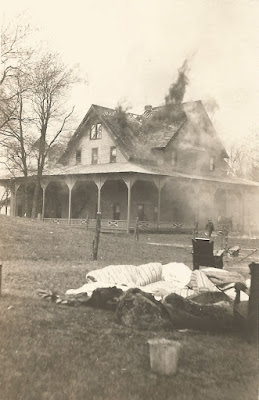Jolly Joe Dunbar
Dunbar’s was the first purpose-built hotel at Stillwater. Published accounts praised its advantages. For example, William Morris, writing in The Baldwinsville Gazette and Farmers' Journal, July 14, 1887, noted, “Jolly Joe Dunbar, the proprietor of the hotel there, will receive you in hearty backwoods style. Joe will give you supper, lodging and breakfast of good quality for one dollar and fifty cents each.” Raymond Hopper in an article titled “Primeval Adirondacks,” published in Forest and Stream, June 18, 1891, added, “Dunbar’s, the only house at Stillwater, is well kept and a favorite place to many; there we got our first venison steak and a comfortable lodging.”
By 1880 business was so good that the Dunbars added a second attached frame hotel building. The hotel continued to be expanded periodically, eventually adding half a dozen waterfront cabins and two boathouses. Dunbar’s had enough business to keep a good number of other guides busy during the hunting and fishing seasons. Guides who worked out of Dunbar’s included Mark Smith, James Lewis, Chris Wagner, Charles H. Smith, Carl Alger, Henry Simons, Hiram Burke, Isaac Stone, John Hitchcock, Carl Hough and Emmett Harris. Joe Dunbar looked like everybody’s idea of an Adirondack guide. He wore homemade buckskin moccasins with the hair on for hunting. He was said to be one of the toughest men in the state and could endure great hardships. Supposedly he was able to sleep out of doors in the snow with the temperature below zero. Like many guides of that era, Dunbar did not believe the game laws applied to him. This resulted in his arrest, along with his son Talcott, for illegal deer hunting in December 1888. The Dunbars’ arrest was highly unusual for the time. Perhaps a complaint of a jealous rival guide or business competitor was what attracted the attention of the authorities.Joseph C. Dunbar was born in 1839 in Sodus, Wayne County, NY. When he was still a child his family moved to the western edge of the forest at Greig in Lewis County. He married Mary E. Warmwood [sometimes spelled Wormwood] of Greig in 1862. They bought some inexpensive wilderness land, cleared the forest and built a farm. Between 1863 and 1873, Joe and Mary had four children: Lucy, James, Albert and Talcott. During this time Joe also worked as a foreman for Lewis, Crawford & Company, the largest employer at Chase’s Lake, employing ten men full-time. The firm operated a saw mill and made hemlock bark extract for tanning.
By the time Joe Dunbar reached his late 40s, he had accumulated enough skill, and enough money to take advantage of the rapidly growing tide of sporting tourists. He must have known that Wardwell wanted to sell the homestead at Stillwater. It was well-situated and already had a good clientele. Joe’s wife Mary agreed to run the hotel and do the cooking while Joe handled the guests and guided them further up the river. Their children were old enough to help with the chores.
Over the next fifteen years, Joe Dunbar became widely known as a good host and an unsurpassed guide. The Dunbar Hotel prospered. It became a destination for adventurous visitors who wanted a slightly refined taste of the wilderness. Middle class sporting tourists came to consider Dunbar’s an essential part of any trip into the upper Beaver River country. By 1891 its location along the west shore of Twitchell Creek at the junction with the Beaver River had become commonly known as “Dunbar’s meadow” or just “Dunbar’s.”
In late 1892, a group of regular visitors approached Joe and asked whether he might be interested in selling the hotel. They made an attractive offer. Joe and Mary decided it was a good time to get out of the hotel business. The group concluded the purchase in 1893. The hotel became the first clubhouse for the newly-formed Beaver River Club, to which I will devote a later post. The Dunbar family returned to their farm in Greig, except for the oldest son, Jim Dunbar, who stayed on to work as the dam keeper and a guide. A year later Joe, Mary and their adopted child, Rose, moved to a farm on the outskirts of Batavia, Genesee Co., N.Y. Joseph Dunbar died there on April 16, 1910, at the age of 71. Mary Dunbar died in September 1913.





Comments
Post a Comment